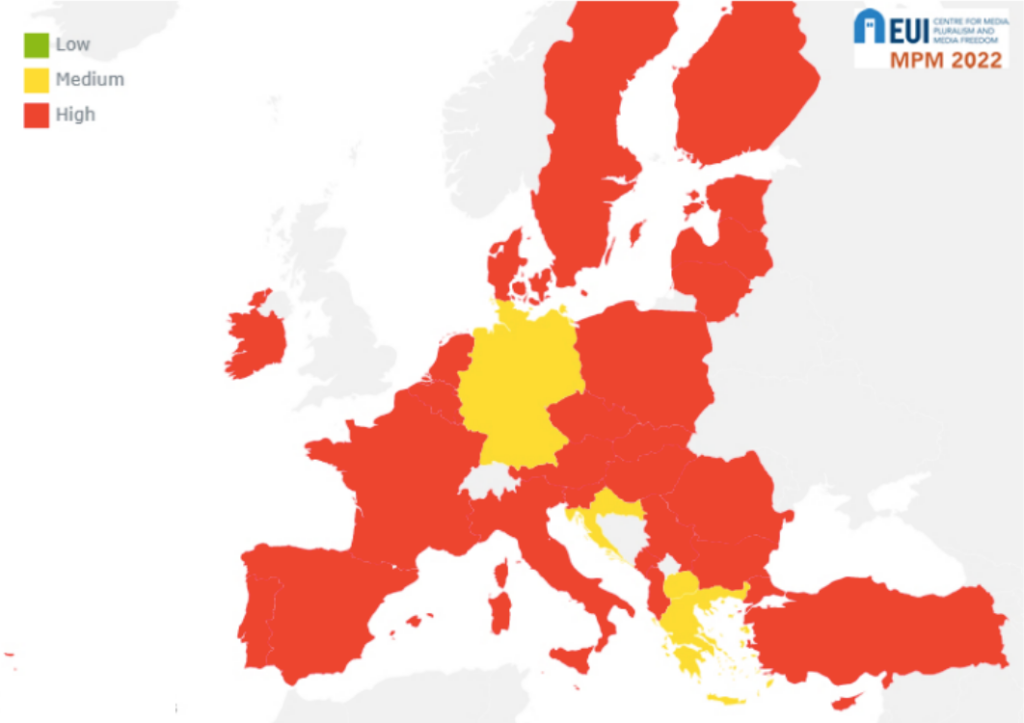[ad_1]
Media focus refers back to the phenomenon of media possession regularly falling into the palms of a small variety of buyers. Lately the difficulty has turn out to be considered one of essential significance: the present development is for media firms to merge with the intention to consolidate their manufacturers, as highlighted within the 2022 Media Pluralism Monitor (MPM) report, produced by the Centre for Media Pluralism and Media Freedom.
The expression and visibility of various opinions are important to the upkeep of a real democracy: they’re the guarantors of pluralism, which means an equilibrium of divergent voices. Media homeowners and shareholders exert appreciable affect on the editorial line of the businesses they personal: this is named the “energy of opinion”. In reality, that is the principle return on funding that patrons of media firms hope to achieve. Though media firms are removed from being among the many most profitable investments, they proceed to draw the curiosity of speculators.
This phenomenon is now commonplace. Examples embody the Australian-American Rupert Murdoch, head of Fox Information and The Solar, and the businessman and politician Silvio Berlusconi, who died final June and owned Italy’s largest personal TV channels.
In France, it’s Vincent Bolloré who fuels a lot of the controversy: Bolloré owns the Canal+ Group, which encompasses 3 nationwide channels (C8, Cnews and CStar), in addition to Prisma média, which runs 35 magazines starting from the superstar journal Voici to Harvard Enterprise Evaluate and the journal for (very) younger audiences, Mortelle Adèle. The Bolloré group additionally owns the video platform Dailymotion, publishing big Hachette, and the mainstream radio station Europe 1. For a number of years now, Bolloré has been pursuing a method of pushing the manufacturers he buys to the political proper, a apply that has been denounced on quite a few events.
This development can also be evident in different European international locations: within the UK, Jonathan Harmsworth, 4th Viscount of Rothermere, controls 40 % of the nationwide press. In Germany, the Bretelsmann group publishes books, broadcasts tv and radio channels and produces movies. Lastly, all 18 regional press titles in Hungary are owned by Andy Vajna, Heinrich Pecina or Lőrinc Mészáros .
The figures are worrying: in 2022, the Media Pluralism Monitor estimated the chance related to media focus within the European Union member states to be 82 % on common. No nation on the European continent presents a low threat, and solely 4 of them are at medium threat.
This threat issue is calculated in keeping with authorized variables – whether or not the nation has laws stopping media focus, whether or not this laws is efficient, and whether or not it’s enforced by an impartial authority – in addition to financial variables – whether or not the sector’s monetary scenario is taken into account to be kind of conducive to media focus.
Information media focus: map of dangers per nation

European merger laws are the final word safeguard towards the failure of nationwide laws, as historian and publishing historical past specialist Jean-Yves Mollier explains to our colleagues at Alternate options Economiques. In accordance with Mollier, the Bolloré and Lagardère teams have been successively stopped of their tracks by Brussels simply as they have been about to ascertain themselves as absolute masters of the publishing sector.
However media focus can’t be curbed by competitors regulation alone: there are way more necessary democratic points at stake than mere financial concerns. Certainly, even when totally different homeowners share European media firms, plurality of opinion stays in danger if the homeowners in query all come from the identical background or the identical political camp.
One other lever within the battle towards the affect of predatory buyers is the duty to be clear. Some imagine that explaining to readers the potential biases of a publication may assist them to take a extra goal view of the – generally biased – info they devour. For instance, an article in regards to the ecological dedication of fossil gasoline firms will likely be interpreted extra objectively if the reader is aware of that the proprietor of the media outlet publishing additionally it is the pinnacle of a number of oil firms.
Obtain one of the best of European journalism straight to your inbox each Thursday
On this context, cooperative media retailers go towards the present development. In reality, the homeowners of the sort of media are its staff and member readers. A person investor can not turn out to be a majority shareholder, and the editorial coverage stays completely impartial of the Basic Meeting, thereby avoiding any threat of battle of curiosity. Lastly, the raison d’être of those genuinely impartial media retailers is larger transparency in decision-making between staff, engaged members and readers.
In brief, media focus in Europe is a trigger for concern. The devastating penalties of this phenomenon on the plurality of opinion, and consequently on the state of democracy, have been amply demonstrated. There’s an pressing must result in lasting change within the European media ecosystem to allow the expression of its range. The emergence of different shareholding fashions, such because the cooperative, and a continent-wide legislative effort are among the many driving forces behind this alteration.
[ad_2]
Source link

